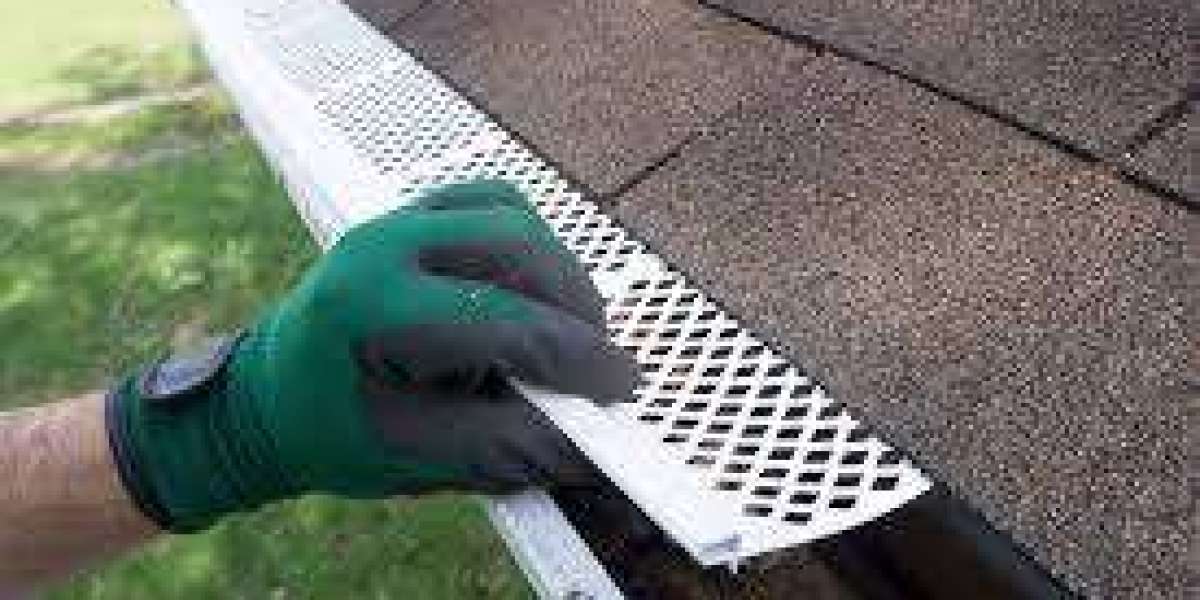Maintaining a clean and functional gutter system is crucial for protecting your home from water damage. One of the most effective ways to ensure this is by installing gutter guards. These simple yet effective devices prevent debris from clogging your gutters, saving time, money, and potential headaches.
In this comprehensive guide, we’ll explore what gutter guards are, their benefits, types, installation tips, and why they are a must-have for every homeowner.
What is a Gutter Guard?
A gutter guard is a protective cover or screen designed to prevent leaves, twigs, and other debris from entering and clogging your gutter system. While allowing rainwater to flow freely, gutter guards reduce the frequency of cleaning and prevent water overflow that could damage your roof, walls, and foundation.
Why Are Gutter Guards Important?
1. Prevents Clogging
Without gutter guards, your gutters can become clogged with leaves, dirt, and debris, leading to water buildup and overflow.
2. Reduces Maintenance Efforts
By keeping debris out, gutter guards minimize the need for regular cleaning, saving both time and money.
3. Protects Against Water Damage
Blocked gutters can cause water to spill over, leading to potential damage to your roof, siding, and foundation. Gutter guards ensure smooth water flow.
4. Deters Pests
Open gutters can become a breeding ground for pests like mosquitoes, rodents, and birds. Gutter guards block access to these creatures.
5. Enhances Gutter Longevity
By preventing debris accumulation and rust, gutter guards can extend the lifespan of your gutter system.
Types of Gutter Guards
There are various types of gutter guards, each with unique features and benefits.
1. Mesh Gutter Guards
- Made from fine mesh that allows water to pass through while blocking debris.
- Suitable for areas with heavy leaf fall.
2. Reverse Curve Gutter Guards
- Designed to direct water into the gutter while debris slides off.
- Effective but may require professional installation.
3. Brush Gutter Guards
- Consist of cylindrical brushes that sit inside the gutter.
- Easy to install but may require frequent cleaning.
4. Foam Gutter Guards
- Foam inserts placed inside the gutter to block debris.
- Affordable but may not last as long as other types.
5. Micro-Mesh Gutter Guards
- Ultra-fine mesh that filters even the smallest debris.
- Provides excellent protection but can be expensive.
How to Choose the Right Gutter Guard
Selecting the right gutter guard depends on various factors:
1. Climate
Consider the weather conditions in your area. Mesh or micro-mesh guards are ideal for regions with heavy rainfall or leaf fall.
2. Roof Type
Certain gutter guards work better with specific roof types. Consult a professional for compatibility.
3. Budget
While high-quality guards may be more expensive, they often offer better durability and long-term savings.
4. Ease of Installation
Some gutter guards are DIY-friendly, while others require professional installation.
Installing Gutter Guards
Installing gutter guards is a straightforward process, but it’s essential to follow proper steps to ensure effectiveness.
Step 1: Clean the Gutters
Before installation, remove all debris and ensure the gutter system is clean.
Step 2: Measure the Gutters
Accurate measurements ensure the guards fit correctly.
Step 3: Choose the Right Tools
Gather necessary tools such as a ladder, gloves, and screws or clips (depending on the type of guard).
Step 4: Install the Guards
Follow the manufacturer’s instructions to secure the guards in place.
Step 5: Test the System
After installation, run water through the gutters to ensure proper flow.
Maintenance Tips for Gutter Guards
While gutter guards reduce maintenance, occasional checks are necessary to ensure optimal performance.
1. Inspect Periodically
Check for damage or accumulated debris, especially after storms.
2. Clean When Necessary
Remove any debris that may have settled on top of the guards.
3. Check for Proper Installation
Ensure the guards remain securely in place.
4. Address Repairs Promptly
Fix any issues immediately to prevent further problems.
Benefits of Gutter Guards for Your Home
Investing in gutter guards offers several advantages for homeowners:
1. Improved Curb Appeal
By preventing water overflow and damage, gutter guards help maintain the appearance of your home.
2. Prevents Ice Dams
In colder climates, gutter guards reduce the risk of ice buildup in gutters.
3. Increases Home Value
A well-maintained gutter system with guards can enhance the resale value of your property.
4. Environmentally Friendly
By preventing debris accumulation, gutter guards reduce the frequency of cleaning, which often involves chemical solutions.
Common Myths About Gutter Guards
Myth 1: Gutter Guards Eliminate Cleaning Entirely
While they reduce the frequency of cleaning, occasional maintenance is still required.
Myth 2: All Gutter Guards Are the Same
Different types of gutter guards cater to different needs and environments.
Myth 3: Gutter Guards Are Expensive
While some types may be costly, affordable options exist for various budgets.
Conclusion
Gutter guards are a valuable addition to any home, offering protection against debris, water damage, and pests while reducing maintenance efforts. With various types available, homeowners can choose the best option to suit their needs and climate conditions.
By investing in a reliable gutter guard, you not only protect your home but also save time and money in the long run. Whether you opt for DIY installation or professional help, gutter guards are a smart choice for maintaining a clean and efficient gutter system.








